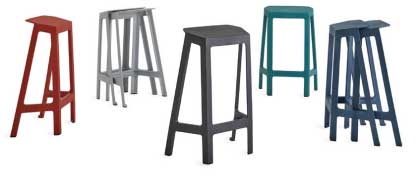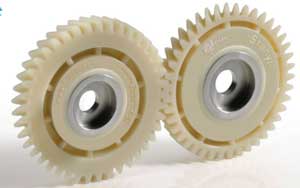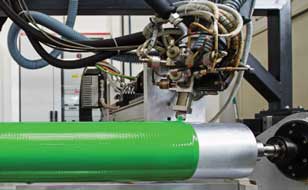K2022: round-up of materials & machinery
Materials
- Avient will showcase itsTPEs (reSound REC) made from recycled polyvinyl butyral (PVB), recycled from laminated car windows by Danish clean technology company Shark Solutions. The TPEs, made from 60% recycled materials, are used in automotive chassis and under-thehood applications.Their performance characteristics are said to be comparable to traditional products, including appearance, feel and physical properties.
- US nylon maker Ascend will highlightVydyne Thermaplus, a new platform of high-temperature, high-ductile PA66 for fasteners; designed as a smarter replacement for PA46; Starflam flame-retardant PAs; and HiDura long-chain PAs for consumer goods and connectors; as well as copolymers for films that make packaging more durable.
- Germany’s BASF will showcase a number of solutions to reduce carbon footprint using renewable or recycled feedstock. BASF’s biomass balancecertified materials are used in the furniture industry or by a safety shoe brand offering a carbon neutral safety shoe containing BASF’s biomass balance PU, certified according to REDcert2.
- Belgian firm Solvay is introducing a new portfolio of high-performanceTecnoflon peroxide curable fluoroelastomers (FKM) produced without the use of fluorosurfactants (a type of PFAS used as process aids). Called NFS (non-fluorosurfactant), it is a breakthrough in FKM polymerisation and aligns with the company’s sustainability roadmap. Peroxide curable FKM rubbers are key to applications in industries from automotive and aerospace, oil & gas, chemical processing, to electronics and healthcare.Typical components include seals, gaskets, O-rings and hoses.
- Germany’s Covestro has tied up with the Zurich-based
bag company Freitag for the recycling of truck tarps, based
on thermoplastic polyurethanes (TPUs) from Covestro. At
the end of their useful life, the tarps are to be chemically
recycled and used for new tarps or other products. Freitag
plans to have a prototype on a truck as early as this year.
Covestro has focused mainly on mechanical recycling of PCs, with numerous products from Covestro already on the market, including PC blends for IT applications with up to 75% recycled material, besides products based on mass balanced raw materials. - Dutch firm DSM Engineering Materials has launched what it says is the industry-first 100% biobased hightemperature PA: Stanyl B-MB, which is a fully ISCC+- certified mass-balancing solution, and delivers the same characteristics, performance as conventional Stanyl. Production of Stanyl B-MB now generates a carbon footprint up to 50% lower than the fossil-based original. In practice, this means a 3.3-tonne CO2 reduction per tonne produced – equivalent to charging 420,000 smartphones.The PA is noted for its high-temperature mechanics, and wear and friction resistance for hightemperature applications in automotive, electronics and consumer goods industries.
- Sabic will introduce Bluehero, an automotive solution
aimed to help accelerate the world’s energy transition to
electric power, with an emphasis on improving structural
battery components with flame retardant materials in
electric vehicles.
Sabic has also joined forces with Heinz, Tesco and Berry in a recycling trial in the UK. Packaging collected fromTesco stores has been used to produce certified circular PP from Sabic’sTrucircle portfolio for microwavable Heinz Beanz Snap Pots, made from 39% recycled plastic. - US-based DuPont’s Mobility and Materials (M&M)
will showcase Hytrel Eco B biobasedTPEs, with a biomass
content of up to 72% by weight; Rynite PET based on
PCR; low-density Zytel PA and foamable grades of Hytrel
for weight reduction. A recent innovation, Hytrel Eco B is
produced under the biomass balance, which is certified
according to the ISCC-Plus standard and is targeted at
consumer/sporting goods, electronics and furniture. It is
also an option for the automotive industry.
In addition, M&M will feature several low GWP materials and solutions, including eCool technology for sustainable EV battery cooling lines and Zytel RS resins that contain between 20-100% material (by weight) derived from castor beans.
It will also show a three-in-one solution for EV batteries: a patent-pending concept to increase energy density that combines three elements into one modular unit to decrease range anxiety, increase passenger room, improve cooling, and integrate components.
Another highlight is DuPont Chemical Bonding, a patented technology simplifying manufacturing via direct PA-aluminium joining, a common challenge for automotive and industrial components, which produces higher bond strength. - Germany’s Lanxess will present a sustainable range of
TPUs and biobased PA 10.10. The recycled TPU products
are primarily intended for sports equipment. One of their
strengths is their good composite adhesion with other
injection-moulded materials when processed using the
insert moulding or hybrid moulding methods. The semifinished products with a PET recyclate matrix are a costeffective
alternative
to virgin
PC/PA, for
example.
The PET
comes
from used
beverage
bottles
and is also
available
in large
quantities
thanks to
the closed recycling chain for these bottles. The biobased
PA 10.10 is derived from castor oil.
Recently, the company has launched a biobased composite material based on flax and PLA; while development is to be completed on a plastic (PA6) matrix for Tepex dynalite, produced starting from “green” cyclohexane with 80% sustainable raw materials. When the matrix plastic is reinforced with continuous-fibre fabrics, the resulting semi-finished products exhibit the same properties as comparable products. These are suitable for applications in structural lightweight design that are typical for Tepex dynalite – such as front-end carriers, seat shells, or battery consoles in vehicles.
Another new product line comprises variants of Tepex with 80% recycled material, based on carbon fibres from post-consumer and post-industrial waste, that yield surfaces with a so-called forged carbon look. A variety of thermoplastics are suitable as a matrix material, such as PA6, PA66, PP or PC, where recycled material made up of these plastics can also be used. It sees good opportunities for these products in applications that require high-class decor and high-grade mechanical properties, such as in car interiors and exteriors or in housings for consumer electronics. - Germany-based Kraiburg TPE will present sustainable
Thermolast RC/UV, with a proportion of post-industrial
recycled materials ranging from 20-40%, targeted at
automotive exteriors, for weathering resistance and a high
surface quality.
Another highlight will be the interior PIR TPE with a proportion of recycled material of up to 38% from externally sourced waste.
Also on show will be the Universal PCR TPE materials with up to 41% PCR that meet the requirements for consumer and industry applications. Mechanical properties are said to match those of standard materials. Compounds are available in natural colour as well as in a grey colour characteristic for recycled plastics, which can be dyed in many different colours as needed.
Kraiburg TPE has also engaged independent firm Institute cyclos-HTP to assess the compatibility of selected TPS (styrenic TPE) materials in the recycling stream for HDPEs and PPs and found that its TPS materials are compatible within the PP and HDPE stream. - Oman-based integrated energy company OQ has developed a portfolio of solutions designed for a wide range of film extrusion applications, including PP, LLDPE and HDPE grades. HP4102M, for example, is a homopolymer PP designed for CPP and is suitable to produce metallisable and lamination films, used for confectionery packaging and food products requiring an aroma barrier. OQ has also developed a range of HDPE and LLDPE film grades to support mono and multilayer film structures providing solutions for a wide range of applications.
- UK headquartered Aquapak has launched Hydropol Polyvinylalcohol (PVOH), a biodegradable and compostable polymer capable of replacing ethylene vinyl alcohol (EVOH) in many applications. When extrusion coated or laminated onto paper, Hydropol adds strength and barriers to oxygen, oil and grease, and its solubility allows 100% paper fibre recovery through paper recycling mills. It can be used in a range of products, including ecommerce mailer bags, and packaging for dried pet food, snacks, cooked meat and convenience food.
- Spanish ABS provider Elix Polymers will focus on sustainability, with the first product with mechanically and chemically recycled content that is already available on the market and validated by customers for key markets such as the automotive industry, the medical sector and consumer goods. One of the products will be E-Loop H801 MR, which contains mechanically recycled material and has properties that are equivalent to the raw material ELIX ABS H801.



(PRA)
Subscribe to Get the Latest Updates from PRA Please click here
Home | Terms & Conditions | Privacy Policy | Contact | Webmail | Site Map
©2022 Plastics and Rubber Asia. All rights reserved.

©2022 Plastics and Rubber Asia. All rights reserved.
Home Terms & Conditions Privacy Policy Webmail Site Map About Us





















